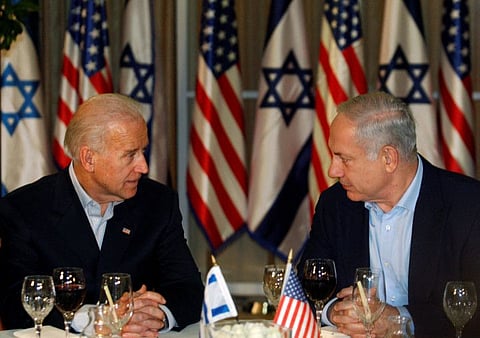Biden, Netanyahu to discuss Saudi normalisation, Iran
Talks will occur 265 days after Netanyahu took office, the longest such gap since 1964’

WASHINGTON: US President Joe Biden and Israeli Prime Minister Benjamin Netanyahu on Wednesday will hold their first face-to-face talks since Netanyahu took power in December, with topics expected to include a potential Israel-Saudi normalisation deal and Iran.
Biden had held off extending an invitation to Netanyahu out of concern about a judicial overhaul that curbs the power of judges undertaken by his right-wing government as well as Israel’s expansion of settlements on the West Bank.
Instead of meeting at the White House - Netanyahu’s preferred venue - the two leaders ended up arranging their talks on the sidelines of the UN General Assembly in New York.
US officials expect the judicial overhaul to come up in their conversations, as well as efforts to counter Iran’s nuclear programme and the possibility of what would be a major development - a normalisation of Israel-Saudi relations.
Netanyahu had expected an earlier US visit given his long history of dealing with American presidents, but Biden had resisted. Netanyahu did not get a meeting in the early months of the Biden White House in 2021 and was then ousted from power. He returned to power last December.
Instead, Biden welcomed Israeli President Isaac Herzog, a largely ceremonial post, to the White House in July to mark the 75th anniversary of Israel’s founding.
The United States, Israel and Saudi Arabia have been discussing a potential deal in which the Israelis and the Saudis would normalise diplomatic relations and Washington and Riyadh would agree on a defense pact, but talks still have far to go.
David Makovsky, a long-time Middle East watcher at the Washington Institute for Near East Policy, noted in a post on X, formerly known as Twitter, that the meeting “will occur 265 days after Netanyahu took office, the longest such gap since 1964.” “The Saudi deal’s enormous potential has left Biden & Netanyahu little choice but to meet despite differences,” he said.
The Biden administration is calculating that the US could reap big rewards from such a mega-deal if it can overcome steep obstacles.
“Many of the elements of a pathway to normalization are now on the table. We don’t have a framework, we don’t have the terms ready to be signed. There is still work to do,” White House national security adviser Jake Sullivan told reporters on September 7.
US officials have not ruled out an eventual White House meeting between Biden and Netanyahu.



